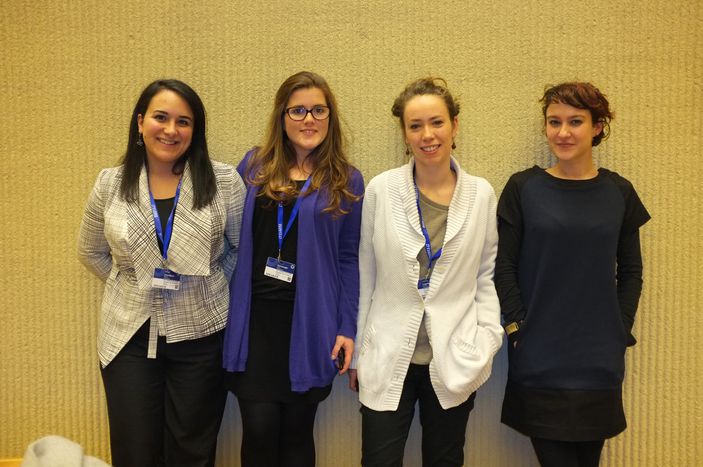
Cafébabel Brussels takes the pulse of European civil society
Published on
Translation by:
Danica JordenCafebabel Brussels journalists take European civil society’s temperature!
Cafebabel Brussels journalists participated in two major meetings between European institutions and civil societ: The closing of the European Year of the Citizen in Vilnius on 12 - 13 December 2013 organised by the European Commission, and the European Day for Civil Society on 18 March 2014 hosted by the European Economic and Social Committee. On the eve of European elections, what is the state of the dialogue between European civil society and the European Union?
A two day review of the European Year of the Citizen 2013 in Vilnius
A jumble of more than a hundred participants of all origins and organisations held discussions during six panels on issues dedicated to the place of civil society in European policy building and a review of the European year dedicated to its citizens.
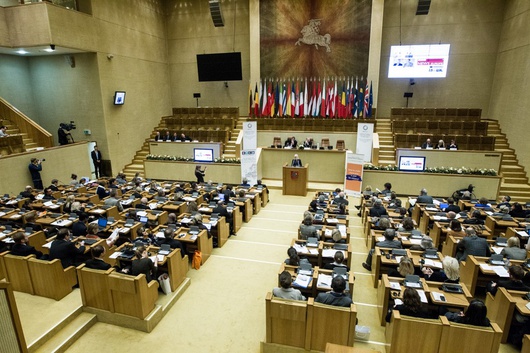 In fact, civil society has never been more active and mobilised. With the crisis, it has even taken on a new dimension: that of mitigating shortfalls due to budget cuts and austerity policies across Europe. Through the development of tools that can be used for citizen participation, the e-participation plateform, many organisations can work in a more horizontal and transnational fashion, placing the citizen at the centre of Europe's destiny. So how to mobilise European citizens is no longer the real question. In effect, the various projects presented at the various sessions have shown civil society's real capacity to organise, and it is up to the EU to effectively take their participation and demands into account, necessitating a reassessment of European institutional functioning and its orientation towards a real dialogue with European civil society. In this context, it seems essential to create these new technological tools with the participation of citizens and not to impose them on them, as citizens must be able to express themselves and engage in the issues of their choice and not simply be consulted from time to time by European decision-makers on issues in an imposed framwork. See the Cafebabel report on the 2013 European year of the citizen closing ceremony
In fact, civil society has never been more active and mobilised. With the crisis, it has even taken on a new dimension: that of mitigating shortfalls due to budget cuts and austerity policies across Europe. Through the development of tools that can be used for citizen participation, the e-participation plateform, many organisations can work in a more horizontal and transnational fashion, placing the citizen at the centre of Europe's destiny. So how to mobilise European citizens is no longer the real question. In effect, the various projects presented at the various sessions have shown civil society's real capacity to organise, and it is up to the EU to effectively take their participation and demands into account, necessitating a reassessment of European institutional functioning and its orientation towards a real dialogue with European civil society. In this context, it seems essential to create these new technological tools with the participation of citizens and not to impose them on them, as citizens must be able to express themselves and engage in the issues of their choice and not simply be consulted from time to time by European decision-makers on issues in an imposed framwork. See the Cafebabel report on the 2013 European year of the citizen closing ceremony
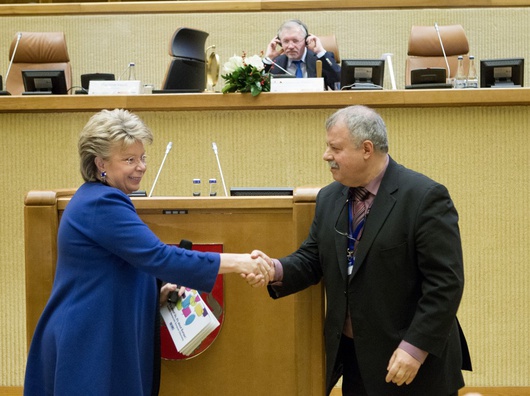 The closing's two days were marked by the official submission of the recommendations of the European Citizens' Alliance by its president, Jean-Marc Roirant, to Commissioner Mme Reding (European Commissioner for Justice, Fundamental Rights and Citizenship). The recommendations hinged on three major themes : Active European citizenship as a project for society, An open and inclusive European democracy and European democracy, three democratic pillars, and were formulated by an alliance of citizens and organisations across Europe. At issue? That the European Commission take these recommendations into account when formulating policies and that the European Union be more democratic.
The closing's two days were marked by the official submission of the recommendations of the European Citizens' Alliance by its president, Jean-Marc Roirant, to Commissioner Mme Reding (European Commissioner for Justice, Fundamental Rights and Citizenship). The recommendations hinged on three major themes : Active European citizenship as a project for society, An open and inclusive European democracy and European democracy, three democratic pillars, and were formulated by an alliance of citizens and organisations across Europe. At issue? That the European Commission take these recommendations into account when formulating policies and that the European Union be more democratic.
A DAY DEDICATED TO europeAn civil sociEtY IN BruSSels
On this past 18 March, the European Economic and Social Committee (EESC) organised the European Civil Society Day.
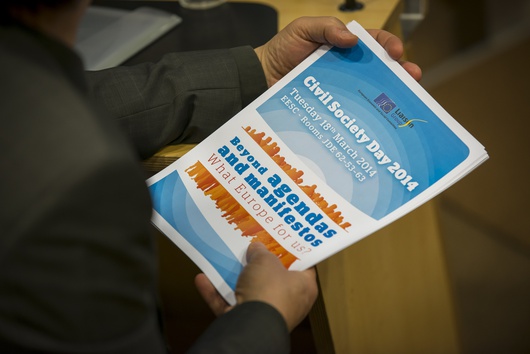 It was the occasion for the European Year of Citizens Alliance (EYCA) to take stock of 2013 and future perspectives on the involvement of civil society for the second half of the EU2020 strategy. The EESC, who is holding the event, is also participating in the development of the New Plan for Europe, which proposes five key actions to consolidate an economic, social, democratic and citizen's European Union .
It was the occasion for the European Year of Citizens Alliance (EYCA) to take stock of 2013 and future perspectives on the involvement of civil society for the second half of the EU2020 strategy. The EESC, who is holding the event, is also participating in the development of the New Plan for Europe, which proposes five key actions to consolidate an economic, social, democratic and citizen's European Union .
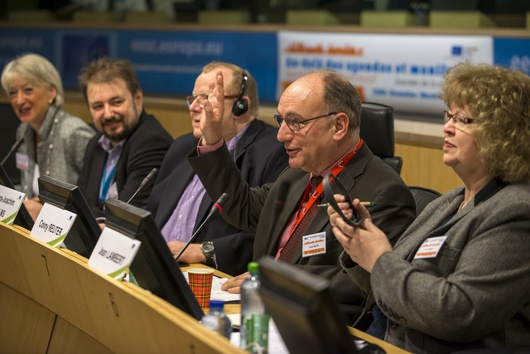 At the day's opening, Jean-Marc Roirant, president of the Alliance (EYCA), noted the silence on the part of Mme Reding (European Commissioner for Justice, Fundamental Rights and Citizenship), to whom he officially submitted the Alliance's recommandations at the European Year of the Citizen's closing ceremony in Vilnius. Nonetheless, this day was the occasion for many European civil society actors to regroup around three principal themes:
At the day's opening, Jean-Marc Roirant, president of the Alliance (EYCA), noted the silence on the part of Mme Reding (European Commissioner for Justice, Fundamental Rights and Citizenship), to whom he officially submitted the Alliance's recommandations at the European Year of the Citizen's closing ceremony in Vilnius. Nonetheless, this day was the occasion for many European civil society actors to regroup around three principal themes:
- An economy for Europe and not a Europe for the economy
This panel noted that European Union governance rests in technocrats' hands. Civil society is not sufficiently involved, or too inadequately involved, in the European decision-making system. The European Economic Union is perceived as not acting in the interests of its citizens.
- A social Europe for its citizens
This workshop was an opportunity to respond to three fundamental questions:
How to construct a social face for the Economic Union? How to link measures taken at the European level with the needs of citizens, and how to respond rapidly and effectively to the urgent social crisis?
- For an active European citizenry
This discussion, centering on the efficiency of the tools put in place by European institutions, observed that the institutions should allow for active citizen participation and a true taking into account of citizen's demands.
Building a sustainable and effective dialogue between institutions and European civil society is a condition central to getting out of the crisis and rebuilding citizens' confidence in their institutions.
See the cafebabel brussels reports on the European day for civil society
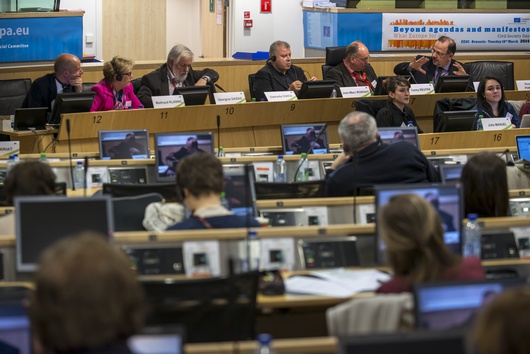 The same message was formulated three months earlier in Vilnius. It's not a question of interesting citizens in Europe but of finding the way to listen to them. The day was concluded by the appearance of the three group presidents of the EESC. All three insisted upon the urgency of the situation, on the eve of European elections, to put the necessary tools and methods into place on a European level, taking into account citizens' interests and demands.
The same message was formulated three months earlier in Vilnius. It's not a question of interesting citizens in Europe but of finding the way to listen to them. The day was concluded by the appearance of the three group presidents of the EESC. All three insisted upon the urgency of the situation, on the eve of European elections, to put the necessary tools and methods into place on a European level, taking into account citizens' interests and demands.
15 maY 2014… WE'RE BEING ASKED TO KEEP QUIET
The accumulation of missed meetings between citizens and the European Union is dangerous, especially on the eve of European elections. In effect, the European Union is marked by a major democratic crisis, and the loss of confidence by citizens towards their institutions will surely be palpable in the elections. The complexity of the democratic tools put into place since the Lisbon Treaty (especially the European citizenship initiative) discourages those who try to use it. The responses given by institutions are too slow and badly adapted to citizens' needs (increase in youth unemployment rate, social crisis, etc.)
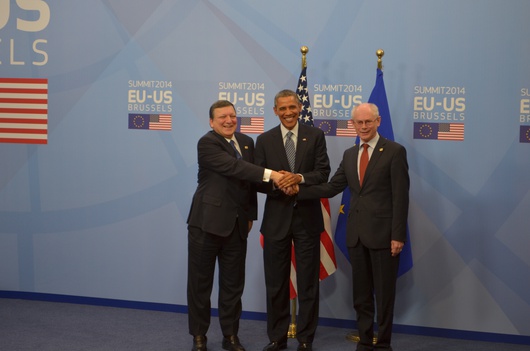 Recently, negotiations over the Transatlantic Treaty between the United States and the EU, without consulting or informing citizens, testifies to a new denial of democracy. Mass arrests at the last Alliance D19/20 gathering this past 15 May demonstrate how dialogue is far from being obtained. In effect, last Thursday 15 May, l’Alliance D19/20 (see the Cafebabel article EUROPEAN COUNCIL OF 19 - 20 DECEMBER: BEHIND THE SCENES) organised a gathering in order to peacefullly protest against austerity and the project for a greater Transatlantic market discussed at the European Business Summit, in the absence of citizens. Even though there were no acts of violence or provocation made by the protestors, 281 people were arrested (among them parliamentarians, union leaders, etc …) and detained for the whole day.
Recently, negotiations over the Transatlantic Treaty between the United States and the EU, without consulting or informing citizens, testifies to a new denial of democracy. Mass arrests at the last Alliance D19/20 gathering this past 15 May demonstrate how dialogue is far from being obtained. In effect, last Thursday 15 May, l’Alliance D19/20 (see the Cafebabel article EUROPEAN COUNCIL OF 19 - 20 DECEMBER: BEHIND THE SCENES) organised a gathering in order to peacefullly protest against austerity and the project for a greater Transatlantic market discussed at the European Business Summit, in the absence of citizens. Even though there were no acts of violence or provocation made by the protestors, 281 people were arrested (among them parliamentarians, union leaders, etc …) and detained for the whole day.
This event unfortunately shows that citizens are not ready to be heard on this subject. Furthermore, in the face of such a burning subject, no response has been given either by member states, nor the major political parties involved in the European campaign (except the GUE/NGL group) see the cafebabel article on the subject TTIP, DON'T MÉLENCHON EVERYTHING !. It is therefore a fact that the heavy burden of informing, discussing and elaborating ways for citizens to participate, rests upon the shoulders of European civil society. If this civil society continues to organise in the face of Europeans' urgent needs, the institutional framework of the European Union should therefore evolve in order to really allow its citizens to participate in Europeans' common future.
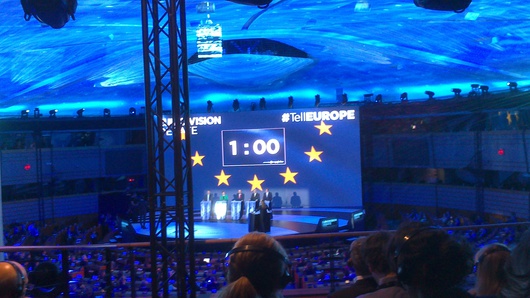 At two major discussions that brought together the main candidates for presidency of the European Commission (E.C.) see the Cafebabel article on the subject: EUROPEAN ELECTIONS: A MINUTE TO CONVINCE, who for the first time will be chosen according to the results of the European elections, the key words used by all the candidates are, "Europe of its citizens" and "more democratic." The discussion is well developed, and furthermore there have never been so many "citizen" parties or gatherings at the elections. The issue now, however, is to put citizen participation into practice in the European decision-making process. With, on the one hand, a lack of confidence in European and national institutions, and on the other, anti-Europe voting, the European Union is at a decisive turning point in its construction. As E.C. candidate Alexis Tsipras recalled, evoking the numerous European decisions made behind closed doors : "Either the EU democratises, listens and responds to its people, or it's the end of the European common future."
At two major discussions that brought together the main candidates for presidency of the European Commission (E.C.) see the Cafebabel article on the subject: EUROPEAN ELECTIONS: A MINUTE TO CONVINCE, who for the first time will be chosen according to the results of the European elections, the key words used by all the candidates are, "Europe of its citizens" and "more democratic." The discussion is well developed, and furthermore there have never been so many "citizen" parties or gatherings at the elections. The issue now, however, is to put citizen participation into practice in the European decision-making process. With, on the one hand, a lack of confidence in European and national institutions, and on the other, anti-Europe voting, the European Union is at a decisive turning point in its construction. As E.C. candidate Alexis Tsipras recalled, evoking the numerous European decisions made behind closed doors : "Either the EU democratises, listens and responds to its people, or it's the end of the European common future."
The candidates for the presidency of the Commission insist that "it would be completely antidemocratic" if none of them were chosen even as they assured themselves that if that should arrive, "the European Parliament will never vote in favour." It is therefore time to take part in the debate by voting, but also by acting to continue to organise together at the European level.
Translated from Cafébabel Bruxelles prend le pouls de la société civile européenne



